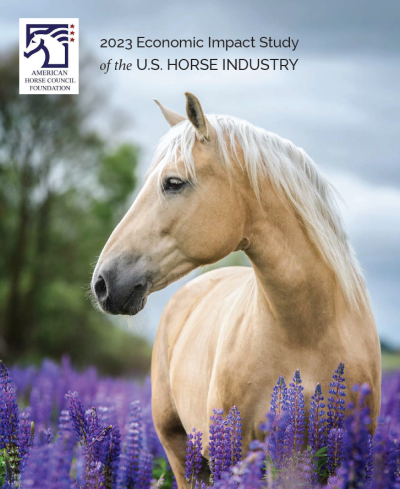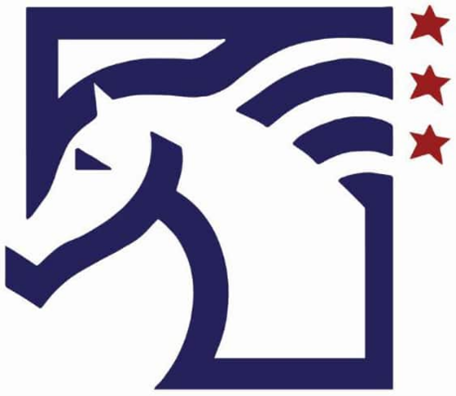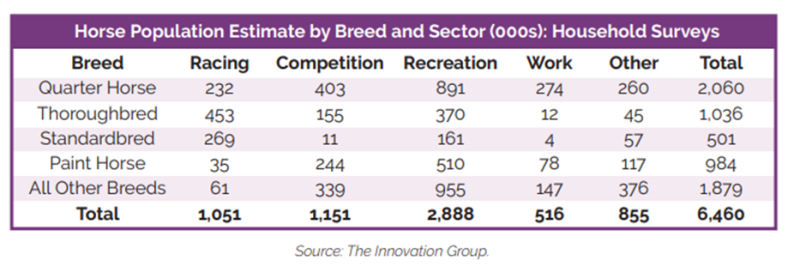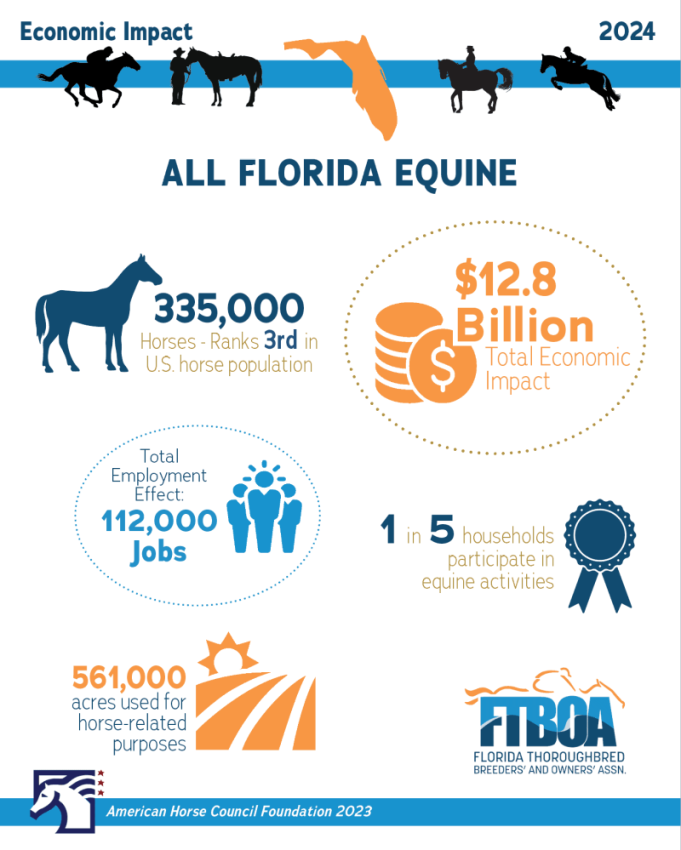The American Horse Council Economic Impact Study was conducted in 2023 with the intention of quantifying the value of the equine industry in national and state economies by considering direct, indirect, and induced spending related to horse ownership, recreation, and equine-related activities. Results were released at the end of January. This study reaffirms that the horse industry is a major agricultural industry nationwide and in Florida.
–
The total population of horses from 2017 to 2023 has declined slightly from 7.2 million to 6.7 million, but there has been an increase in jobs and expenditures. Quarter horses and Thoroughbreds (Jockey Club) remain the largest breed registries.
–
 Equine Industry in Florida
Equine Industry in Florida
-
Florida ranks third in equine population with ~335,000 head, behind Texas and California.
–
-
Contributes $12.8 billion to the Florida economy; Thoroughbreds contributing $3.24 billion
–
-
Creates more than 112,000 jobs; 33,500 attributed to the Thoroughbred industry
–
-
One-in-five households participate in equine activities
–
-
561,000 acres of land dedicated to equine and equine-related activities.
–
Marion County (Ocala) has more horses and ponies than any other county in the United States (75,000) and nearly 50% are Thoroughbreds. Ocala is second only to Lexington, Kentucky in terms of stakes winners and Kentucky Derby champions. In truth, many Kentucky bred champions are trained in Florida.
Lonny Powell, CEO of Florida Thoroughbred Breeders’ and Owners’ Association said “Florida, and specifically Marion County, has clearly maintained its rightful position as Horse Capital of the World ® by population, participation and economic value.”
Equine Tourism
The simple fact that our ground rarely freezes combined with mild winter weather has made Florida a place where owners and equestrians migrate during the winter months to compete and to train.
The World Equestrian Center opening in 2021 has been credited with increased equine activity, attracting even more horse owners/enthusiasts from out of state.
Non-horse owning event participants and spectators spent $2.7 billion in Florida on travel, dining and lodging while participating in or attending events.
–
Making the case for the horse industry
 Folks involved in animal agriculture face many challenges. The ever-increasing population of our state means decreasing acreage dedicated to farming. When our local, state, and federal elected officials consider policies regarding zoning, land use, clean water, taxes, and other important issues that impact potential to remain in business, this type of data is essential as we advocate for our industry. Information from this and previous studies can help identify trends that indicate areas of growth, demographics, underserved geographic areas, research and educational needs, job expansion, prospective markets, and effects of recession on breeding and horse populations. Other ways to use these data might be to help fight for green space and public land, defend against adverse legislation, regulation or development that might negatively impact the industry.
Folks involved in animal agriculture face many challenges. The ever-increasing population of our state means decreasing acreage dedicated to farming. When our local, state, and federal elected officials consider policies regarding zoning, land use, clean water, taxes, and other important issues that impact potential to remain in business, this type of data is essential as we advocate for our industry. Information from this and previous studies can help identify trends that indicate areas of growth, demographics, underserved geographic areas, research and educational needs, job expansion, prospective markets, and effects of recession on breeding and horse populations. Other ways to use these data might be to help fight for green space and public land, defend against adverse legislation, regulation or development that might negatively impact the industry.
“The Economic Impact Study is the most effective tool in our advocacy quiver,” AHC President Julie Broadway said, “When the industry needs to take aim at an issue, this data is invaluable in helping us paint the picture of the contributions the industry makes and the breadth and depth of its composition.”
–
For more information and to purchase a copy of the survey results go to:
Economic Impact Study – American Horse Council
- Dr. Saundra TenBroeck is Looking Forward to Looking Back after 40 Years of Service - October 10, 2025
- End of Life Issues – Euthanasia:A Horse Owner’s Final Act of Care - October 4, 2024
- Economic Impact Study Indicates the Florida Equine Industry Remains Strong - April 12, 2024



